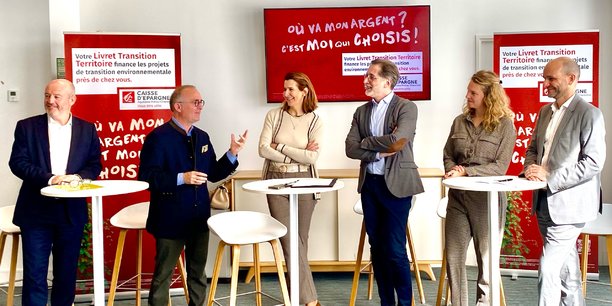Fund the real economy near you and know exactly where your money is going. It is both an old promise of the banks and an old political debate about which the candidates in the last regional elections in 2021 The challenge was then to mobilize New Aquitaine savers to enter the regional VSEs, SMEs and ETIs their too often insufficient capital . A complex financial mechanism because it necessarily involves the immobilization of savings and the risk of loss.
Seducing small carriers
There is therefore a different and simpler strategy adopted by the savings bank of Aquitaine Poitou-Charente with its territorial transition booklet (LTT) launched on May 2: it is not a matter of injecting capital but of distributing classic loans to businesses, associations and social landlords to finance environmentally sound projects. ” Every euro deposited will be used to exclusively finance environmental transition projects, nearbyassures Frédérique Destailleur, president of the board of the regional bank. We put ourselves in the place of the rescue customer who wants to support efforts to decarbonize the economy, but who does not identify a product to do so. »
For savers – individuals, private professionals, associations and institutions – the sums can vary from ten to 30,000 euros and remain completely liquid. The LTT rate is 3% until July 31st then 1% thereafter, i.e. a lower reward than that of Livret A, set at 3% until January 2025, but comparable to that of other unregulated livrets. The CEAPC therefore relies first on activist engagement to convince small owners to open and then refill LTTs in order to raise sufficient amounts and thus guarantee the liquidity of deposits. Among the first institutional subscribers are the social landlords Domofrance and the Housing Office of La Rochelle.
The promise of transparency
And for the sci-urban bank, the LTT will play its attractiveness on the notion of transparency. On the one hand, savers will be periodically informed about the use of their savings to know who it benefits and for which projects. These are projects on green mobility, energy renewal, renewable energies, decarbonization of activities, etc.
On the other hand, the organizations that took a loan – VSEs, SMEs, ETIs, social employers, associations or communities – undertake to present their actions, including through live meetings with savers to explain their approach. ” This notion is crucial to guaranteeing confidence to savers. Project managers who do not want to commit to this transparency will not be able to be funded by the LTT even if they can of course apply for other funding from the CEAPC. », specifies Frédérique Destailleur.
The CEAPC bank, however, did not choose to use a third party to measure and certify the reality of the environmental effects of the projects that will be financed by the LTT even though this is a key element to avoid green washing or impact. ” This would be too cumbersome in the context of granting a bank loan that requires a certain reactivity. We have our own criteria to define what is sustainable, but the commitments will be evaluated a posteriori in the framework of the CSRD audit (sustainability report linked to European regulations, Editor’s Note) which will control the allocation of amounts to sustainable investments. », answers the president of the board.
A few hundred million euros
” We currently finance 110 to 130 million euros of projects that meet the LTT criteria, while on the other hand the identified funding needs have doubled in three years and are increasing by 40% per year. », adds Frédérique Destailleur. ” We therefore hope to collect a few hundred million euros through the LTT in our nine departments to meet this requirement. The challenge will be to raise new funds over time. » This will remain the first step compared to the 21 billion euros of brokered highlights that can be mobilized by the CEAPC.
According to the Pisani Mahfouz report, published in 2022 then taken by France Stratégie last year, the objectives of climate neutrality in France require ” important action » especially at a financial level by mobilizing around 70 billion more euros for sustainable investments. Reducing this amount to the weight of the GDP of New Aquitaine, this requires mobilizing almost five billion euros per year.
According to the website Changedebanque.org, with more than 51 billion dollars allocated to the fossil fuel sector (coal, oil and gas), the finance and investment bank of the BPCE group (Banque populaire Caisse d’épargne), Natixis, is the fourth most active bank in this sector since the Paris Agreement, behind BNP Paribas, Société Générale and Crédit Agricole.

